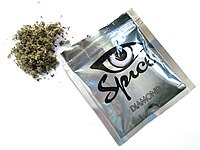
Photo from wikipedia
The widespread recreational use of synthetic cannabinoids (SCs) has become a serious health issue. Reports of life-threatening intoxications related to SC consumption have markedly increased in recent years, including neurotoxicity,… Click to show full abstract
The widespread recreational use of synthetic cannabinoids (SCs) has become a serious health issue. Reports of life-threatening intoxications related to SC consumption have markedly increased in recent years, including neurotoxicity, cardiotoxicity, nephrotoxicity, and hepatotoxicity. We investigated the impact of acute administration of the synthetic cannabinoid XLR-11 (3 mg/kg, i.p. for 5 consecutive days) on the liver in BALB/c mouse animal model. Using real-time quantitative RT-PCR, MDA assay, and TUNEL assay, we found consistent up-regulation of a variety of genes involved in oxidative stress (NOX2, NOX4, and iNOS), inflammation (TNF-α, IL-1β, IL-6), and apoptosis (Bax) in the liver of XLR-11 treated mice compared to control mice. These finding were supported with an elevation of MDA levels and TUNEL positive cells in the liver of XLR-11 treated mice which further confirm increased oxidative stress and apoptosis, respectively. Histopathological analysis of the liver of XLR-11 treated mice confirmed pronounced hepatic necrosis associated with inflammatory cell infiltration. Furthermore, elevated ALT and AST serum levels were also identified in XLR-11 treated mice indicating possible liver damage. Overall, SC-induced hepatotoxicity seems to be mainly mediated by activated oxidative stress and inflammatory processes in the liver, but the specific mechanisms involved require further investigations. However, the present study shed light on the potential deleterious role of acute administration of SCs in the progression to acute hepatic injury which enhances our understanding of the adverse effect of SC consumption.
Journal Title: Toxics
Year Published: 2022
Link to full text (if available)
Share on Social Media: Sign Up to like & get
recommendations!